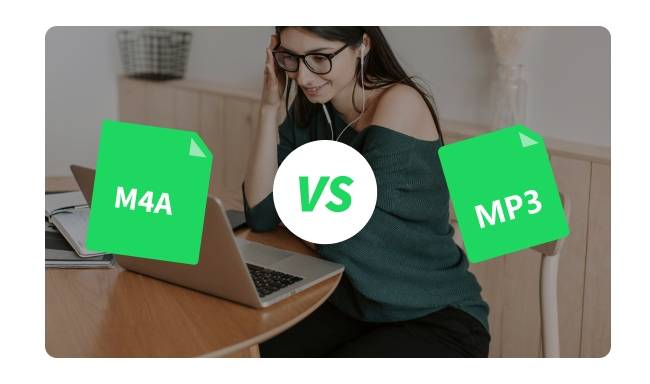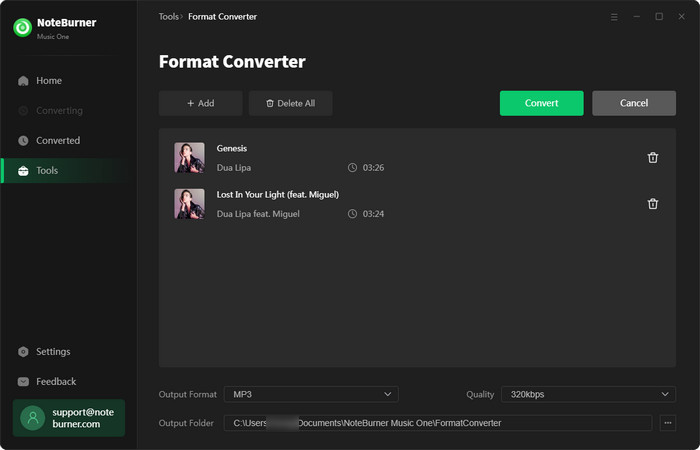

M4A and MP3 are popular digital music formats, but how are they different?
In this article, we'll explain what makes M4A and MP3 unique. We'll go over the pros and cons of each format, like sound quality, file size, and compatibility, so you can pick the one that's right for you. We'll also show you how to easily convert M4A files to MP3. You'll know all you need to about M4A and MP3 file formats!

M4A stands for MPEG-4 Audio, a type of audio file made by Apple. It uses a method called Advanced Audio Coding to compress files. One big benefit of M4A is that it delivers clear and detailed sound for music, audiobooks, and podcasts without using too much storage space. It's especially good for Apple devices and iTunes, but it also works with many other devices and media players. This makes M4A a great choice for all your audio needs.
MP3 stands for MPEG-1 Audio Layer 3. It's both a way to compress audio and a file format for storing that compressed sound. The file extension is ".mp3".
Even though MP3 loses some audio data to make files smaller, it's been popular since 1995 because it strikes a good balance between sound quality and file size. Plus, it works on almost any device.
You can change the file size of an MP3 by adjusting the bit rate. A higher bit rate means better sound quality but a larger file, while a lower bit rate results in a smaller file but lower sound quality.
The main difference between M4A and MP3 is that M4A offers higher sound quality and more efficient compression, while MP3 is a more common and widely supported audio format.
Below is a table summarizing the key comparisons M4A Vs. MP3:
| M4A | MP3 | |
| Extension | .m4a | .mp3 |
| Sound Quality | Higher sound quality | Good sound quality |
| Birrates | Even at a low bit rate, the sound quality stays pretty good. | If the bit rate is low, you might notice a drop in sound quality. |
| Compression | More efficient | Less efficient |
| File Size | For the same sound quality, typically larger. | For the same sound quality, generally smaller. |
| Compatibility | Less common but works with many modern devices. | Highly compatible with almost all devices. |
| Usage | Great for those who prioritize sound quality. | More widely used. |
Now you have known the differences between M4A and MP3, but which one should choose? Actually, it depends on your priorities:
 Want higher audio quality - choose M4A
Want higher audio quality - choose M4AIf sound quality is your main concern, go with M4A. Its advanced AAC (Advanced Audio Coding) compression provides better audio fidelity than MP3. This means you'll get richer, clearer, and more immersive sound, making it perfect for music. For the best audio experience, M4A is your best choice!
 Want smaller size space - choose MP3
Want smaller size space - choose MP3If you want to save storage space, MP3 is a great option. MP3 files are smaller than M4A files, so you can save more music or audiobooks on your device. This is perfect if you have a lot of files and want to make sure you don't run out of space. For maximizing your storage, MP3 is a good choice!
 Want listen onto more devices - choose MP3
Want listen onto more devices - choose MP3If you're worried about compatibility, MP3 is the best choice. It's an open format that works with almost any device or platform, so you won't have trouble playing your files anywhere. While M4A is great with Apple devices, it might not work as well on Android phones or older hardware. For smooth playback on all your devices, choose MP3!
You can convert M4A to MP3 in a few different ways - use free online M4A to MP3 tools or install software like VLC Media Player on your computer to finish this task.
Here we suggest using NoteBurner Music One. It's a handy tool that lets you convert music files between MP3, M4A, FLAC, WAV, OGG, and AIFF formats. You can also batch convert M4A to MP3 or convert MP3 to M4A.
Besides converting files, NoteBurner can handle other tasks too. It can record streaming music (like Spotify) to MP3, edit ID3 tags, burn CDs, convert audiobooks, remove vocals from songs, and free download podcasts and radio shows. It's a great all-in-one tool for managing your music.
Step 1 Get NoteBurner M4A to MP3 Converter and install it on your computer.
Step 2 Click "Tools" on the left side of the main screen and choose "Format Converter".

Step 3 Drag and drop the M4A file you want to convert onto the screen of format converter tool. Set the output format to "MP3". Also choose your desired audio quality and output folder.
Step 4 Click the "Convert" button to begin the M4A to MP3 conversion process. It will finished soon.

If you prioritize sound quality and use Apple products, M4A is a great choice. If you need to save storage space and want universal compatibility, MP3 is more suitable.
The bitrate affects both sound quality and file size. For better sound quality, choose a bitrate of 320 kbps or higher. If you want smaller files, a bitrate between 128kbps and 192kbps is common.
Yes, converting from M4A to MP3 may reduce sound quality. M4A usually offers better quality, so if you want to keep the sound quality, use the highest bitrate possible when converting M4A to MP3.
In conclusion, M4A and MP3 each have their strengths. M4A offers superior sound quality with more efficient compression, while, MP3 is known for its smaller file sizes and wide device support. Your choice between the two formats depends on your needs.
And if you wanna convert M4A to MP3, or convert MP3 to M4A, NoteBurner provides a free toolbox for this task.